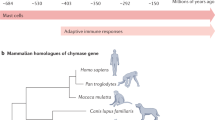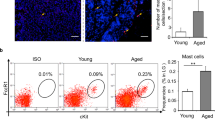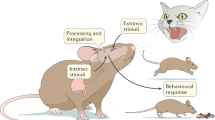Abstract
IN the central nervous system, the occurrence of mast cells in the pineal1 and neurohypophysis2 appears to be well established. They have been noted in the normal olfactory bulb3. They occur also in the human brain under pathological conditions, for example around infarcts and in the plaques of multiple sclerosis4, as well as around the cerebral vessels of ageing animals5.
This is a preview of subscription content, access via your institution
Access options
Subscribe to this journal
Receive 51 print issues and online access
$199.00 per year
only $3.90 per issue
Buy this article
- Purchase on Springer Link
- Instant access to full article PDF
Prices may be subject to local taxes which are calculated during checkout
Similar content being viewed by others
References
Quay, W. B., J. Morph., 98, 471 (1956).
Gray, J. H., J. Anat., 69, 153 (1935).
Torsegno, M. E., Note Riv. Psichiat., April, 215 (1935) cited by Selye, H., The Mast Cells (Butterworths, 1965).
Neumann, J., Virchows Arch. Path. Anat. Physiol., 122, 378 (1890).
Kellsall, M. A., and Lewis, P., Fed. Proc. Fed. Amer. Soc. Exp. Biol., 23, 1107 (1964).
Author information
Authors and Affiliations
Rights and permissions
About this article
Cite this article
CAMPBELL, D., KIERNAN, J. Mast Cells in the Central Nervous System. Nature 210, 756–757 (1966). https://doi.org/10.1038/210756b0
Issue Date:
DOI: https://doi.org/10.1038/210756b0
This article is cited by
-
Immune cell compartmentalization for brain surveillance and protection
Nature Immunology (2021)
-
Mast cells' involvement in inflammation pathways linked to depression: evidence in mastocytosis
Molecular Psychiatry (2016)
-
SWAP-70 is a guanine-nucleotide-exchange factor that mediates signalling of membrane ruffling
Nature (2002)
-
Cytochemical variation of mast cells in the skin of the rat
Archives for Dermatological Research (1977)
-
Demonstration of mast cells in the albino rat brain
Experientia (1974)
Comments
By submitting a comment you agree to abide by our Terms and Community Guidelines. If you find something abusive or that does not comply with our terms or guidelines please flag it as inappropriate.



